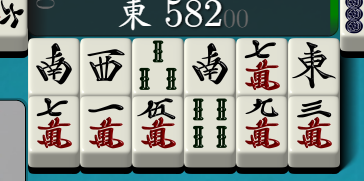What's it take to be an M-leaguer?
Disclaimer… Most of these opinions are cannibalised with permission from Kuroki-pro’s note! It’s in Japanese but link is here… https://note.com/kinmakuroki
Kuroki-pro has been writing a series of articles directed at younger pros and what he thinks they should know as they navigate the world of mahjong. The most recent one was very informative and I think close to a lot of our hearts.
What do you need to do to become an M-Leaguer?
I’m sure most of us has dreams of making it to the big table and sitting up there with thousands cheering you on with each draw and discard. And to make it even more delicious, you could be the one breaking records, being the first non-Japanese to make it…
So what did Kuroki-pro recommend for those with the big ambitions? I’m not going to just repeat his article, I’ve tried to distil what I think are the most important for us non-Japanese players to take note of.
I’ve broken those down into three elements:
1) Play the part
2) Dress the part
3) Act the part
Play the Part
This one should be obvious. Being very strong at mahjong is going to get your noticed. However, Kuroki-pro is quite clear in that is not enough to be selected by an M-League team.
Curiously, he calls out an over-reliance on AI coaches:
AIと同じじゃない打牌を「ミス」と呼び「僕は打牌ミスしないんです」と言って牌譜を提出することでもないんです
“Calling any discard that does not match what the AI suggests as a mistake and submitting game logs to demonstrate you did not make a single error is not strength.”
I do think we can try to find shortcuts to being strong but it is a long and difficult journey. We’re playing other people after all and not computers (yet!).
However, winning titles and events is as close enough a metric as we can hope for to measure strength. So get winning!
Dress the Part
Look at those streamed mahjong games and it is suits and smart shirts for the gentlemen and well-considered ensembles for the ladies. Fashions obviously differ outside of Japan, including our views on formality, but the rolled-out-of-bed on day two of the tournament may not be the best selling point. I’m all for smart casual but some of the choices I’ve witnessed fall far below the standards set by our own societies. And, for heaven’s sake, clean your hands!
Being clean and well-dressed is a way to respect yourself, the other players and your game.
Act the Part
On the same thread as respect … Make sure you turn up on time and be amenable. Complaints come easy to all of us. Particularly at European events, food almost always seems to be a trigger spot. Obviously, I’m not saying you should never speak-up or voice your opinion; what you don’t want to do is come off as petty or scary.
My personal view is to consider not necessarily what you’re saying but how you’re saying it. If you were in your workplace, is that how you would give feedback? Trying to be constructive and helpful will always be welcomed and will leave a great impression on the people you interact with.
In the modern age, leaving a great impression extends on to social media. We live in divisive times and it is way too easy to complain in a very unconstructive fashion on Twitter/X. Think twice about how people may see you from what you’re publishing.
Coaches are making subjective decisions on whether you will fit well with the incumbents.
Kuroki-pro mentioned multiple other things so if you can read Japanese, I would recommend subscribing to his note.
An M-League European Chapter?
So why was I driven to write up this article? I do imagine a day in the future where non-Japanese players may also be competing for those precious M-League spots. Right now the World Riichi Championship is the best interface for non-Japanese budding players and the Japanese pros to interface.
This is a crucial aspect for the foreign Riichi scene. We’re all very used to being individuals when we attend events. We don’t have to consider others and that is especially true in our more individualistic cultures compared with a more ‘collectivist’ Japan (granted that is a horrible over-simplification of multiple nuanced cultures but it serves a general purpose in understanding our issue here).
If we want the outcomes that we like in Japan, we need to start using the same inputs. That might mean less of an immediate and constant focus on our own success and achievement on our tournament circuits but finding ways to contribute and lift up the community as a whole.
When the level rises, we all rise with it.


